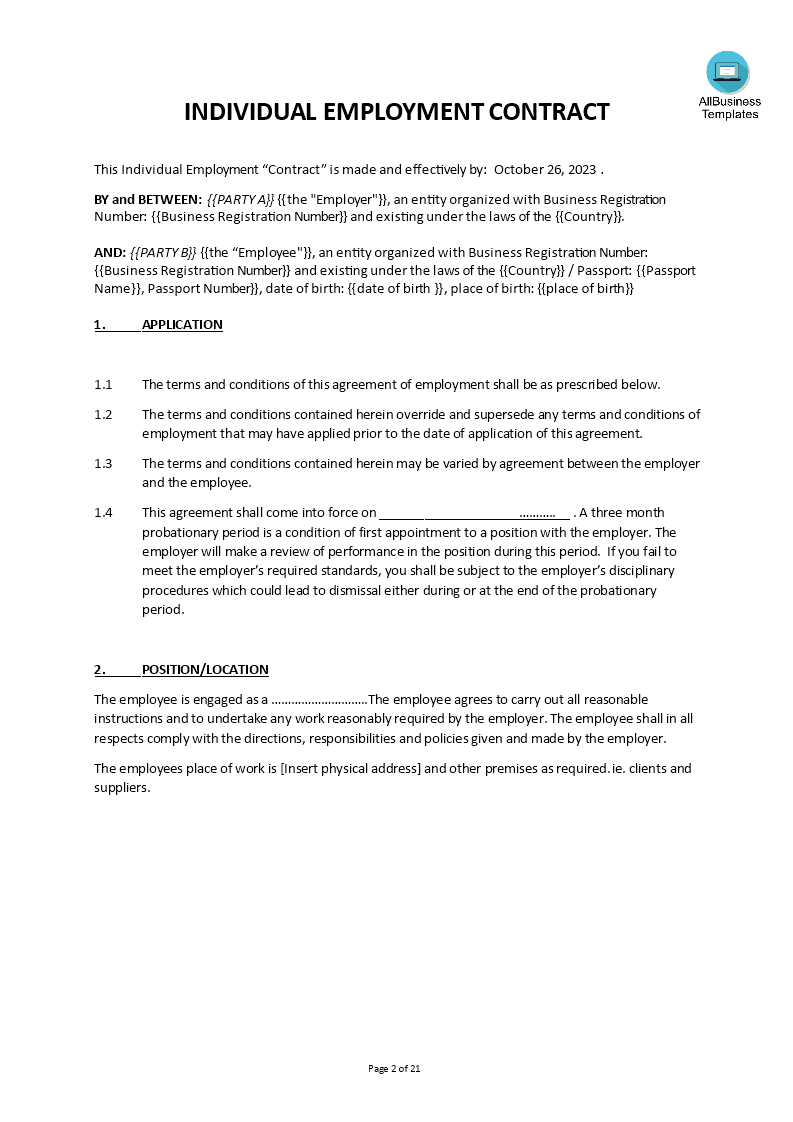Individual Employment Contract
Save, fill-In The Blanks, Print, Done!

Download Individual Employment Contract
Today: USD 7.99
Download It Now

Available premium file formats:
Microsoft Word (.docx)- This Document Has Been Certified by a Professional
- 100% customizable
- This is a digital download (116.06 kB)
- Language: English
- You will receive a link to download the file as soon as your payment goes through.
- We recommend downloading this file onto your computer.
How to write an Individual employment contract? How is individual employment defined? Our templates are tailored to the specific needs of each individual, so you can be confident that your contract will be legally binding and cover all essential details. We also provide sample contracts to help guide you through the process. Download this individual employment contract template that will perfectly suit your needs!
An individual employment contract, also known as an employment agreement, is a legally binding document that establishes the terms and conditions of employment between an employer and an individual employee. This contract outlines the rights and responsibilities of both parties and serves as a reference point for the employment relationship. Individual employment contracts are common in many countries and are essential for providing clarity and protection for both employers and employees.
Here are the key elements typically included in an individual employment contract:
- Identification of Parties: The contract begins by identifying the employer and the employee, including their legal names, addresses, and other relevant contact information.
- Job Description and Duties: The contract specifies the job title and provides a detailed description of the employee's responsibilities, tasks, and duties. This helps clarify the employee's role within the organization.
- Work Hours: The contract outlines the expected working hours, including the regular work schedule, breaks, and any overtime or shift work requirements. It may also address considerations related to remote work or telecommuting if applicable.
- Compensation: This section details the employee's compensation package, including the base salary or hourly wage, any bonuses, commissions, benefits (such as health insurance or retirement plans), and the frequency of payment (e.g., weekly, bi-weekly, monthly).
- Duration of Employment: The contract specifies whether the employment is permanent, temporary, or for a fixed term. It may also include provisions related to probationary periods and termination notice periods.
- Termination and Resignation: The contract outlines the conditions under which either party can terminate the employment relationship and the notice period required. It may also address severance pay and exit procedures.
- Confidentiality and Non-Disclosure: Many contracts include clauses that require the employee to maintain confidentiality about the employer's proprietary information and trade secrets.
- Non-Compete and Non-Solicitation: Some contracts may include clauses that restrict the employee from working for competitors or soliciting the employer's clients or employees after leaving the company.
- Intellectual Property: In cases where the employee may create intellectual property or inventions during their employment, the contract may address the ownership and rights to such creations.
- Dispute Resolution: The contract may specify how disputes or disagreements will be resolved, whether through arbitration, mediation, or litigation.
- Governing Law: It identifies the jurisdiction or state law that will govern the employment contract and any disputes arising from it.
- Other Provisions: The contract may include other clauses related to benefits, company policies, safety regulations, and any other specific terms and conditions relevant to the employment relationship.
Individual employment contracts are legally binding, and both the employer and the employee are expected to adhere to the terms and conditions specified in the agreement. It is advisable for both parties to thoroughly review and understand the contract before signing it. Additionally, employment laws and regulations can vary from one jurisdiction to another, so it's important to ensure that the contract complies with local labor laws. If there are any concerns or uncertainties, consulting with legal counsel or HR professionals is a prudent step.
Download this individual employment contract template now and use it to create legally binding contracts for your employees. Get your contract now and make sure everyone is on the same page.
DISCLAIMER
Nothing on this site shall be considered legal advice and no attorney-client relationship is established.
Leave a Reply. If you have any questions or remarks, feel free to post them below.
Related templates
Latest templates
Latest topics
- GDPR Compliance Templates
What do you need to become GDPR compliant? Are you looking for useful GDPR document templates to make you compliant? All these compliance documents will be available to download instantly... - Google Docs Templates
How to create documents in Google Docs? We provide Google Docs compatible template and these are the reasons why it's useful to work with Google Docs... - IT Security Standards Kit
What are IT Security Standards? Check out our collection of this newly updated IT Security Kit Standard templates, including policies, controls, processes, checklists, procedures and other documents. - Letter Format
How to format a letter? Here is a brief overview of common letter formats and templates in USA and UK and get inspirited immediately! - Google Sheets Templates
How to work with Google Sheets templates? Where to download useful Google Sheets templates? Check out our samples here.
cheese
